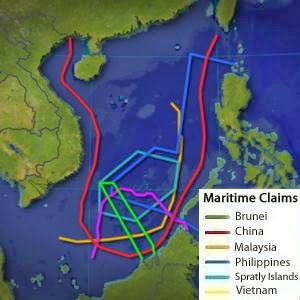China threatens PH with bad consequences
 |
| Territorial sea row in the South China Sea |
According to former ranking government officials in the Philippines, there is a possibility that China could use its technological might to sabotage either the energy projects or introduce virus into the country's sensitive communications data.
Former Interior and Local Governments Secretary Raffy Alunan said in a broadcast interview that he received a report that the country's electric grids could be shut down remotely, which could cripple the electricity distribution in the Philippines.
Currently, China owns at least 40 percent of the stakes in the National Grid Corporation of the Philippines through the former state grid. But an official of the NGCP said this wouldn't happen considering that China will not gamble its investments in such a gigantic project.
In reaction to the made allegations by Alunan in a broadcast interview with ANC, NGCP spokesperson Atty. Cynthia Alabanza explained that China doesn't control beyond the technological aspects of the business.
The territorial row stemmed from China's continues aggression over a select few of islands in the South China Sea, saying its owns these islands ever since.
Under the United Nations Convention on the Laws of the Seas (UNCLOS), all the islands within the West Philippine Seas belong to the Exclusive Economic Zone of the Philippines (EEZ). But China continues to ignore this assertion, despite its being a signatory to the UNCLOS. Critics are saying that China shouldn't have signed as part of the UNCLOS if it continues to violate an international protocol.
But why is China so desperate to lay claims on some of the islands in the West Philippine Seas, which in the eyes of the world, belong to the Philippines?
Former National Security Adviser Roilo Golez said that the Recto Bank in the West Philippine Seas is believed to produce at least five billion barrels of oil and huge natural gas deposits which could generate billions of dollars for whoever can tap their potentials.
Because of these, China's bullying tactics continues to undermine what is embodied in the provisions of UNCLOS. In fact, the Chinese Coast Guards recently bombarded Filipino fishermen who were fishing in one of the islands in the West Philippine Seas, with water cannons as a warning to them.
At this writing, Chinese Coast Guard ships are always seen patrolling the group of islands, which is legally under the territorial jurisdiction of the Philippines.
There is also a possibility that China may introduce computer virus to the government's communications data. However, China is aware that it doesn't have the monopoly of the computer technology to inflict severe damage on sensitive websites in the Philippines. Perhaps, China has forgotten that the Philippines has a lot of computer experts who are always ready to protect the country's sensitive data.
In the past, some Chinese hackers have already defaced some of the Philippines' government websites. Pending the Philippine government's filing of the complaint with the ITLOS on March 30, China is getting nervous, a sign that many international observers consider as a manifestation of weakness in so far as
its claims on some of the islands and shoals in the West Philippine Seas are concerned.
My only concern is that China may be thinking of annexing all the islands in the South China Sea like what Russia did to Crimea in Ukraine. Hopefully, China will not be stupid enough to think about this because it is aware that its image will look bad before the eyes of the world.


Comments